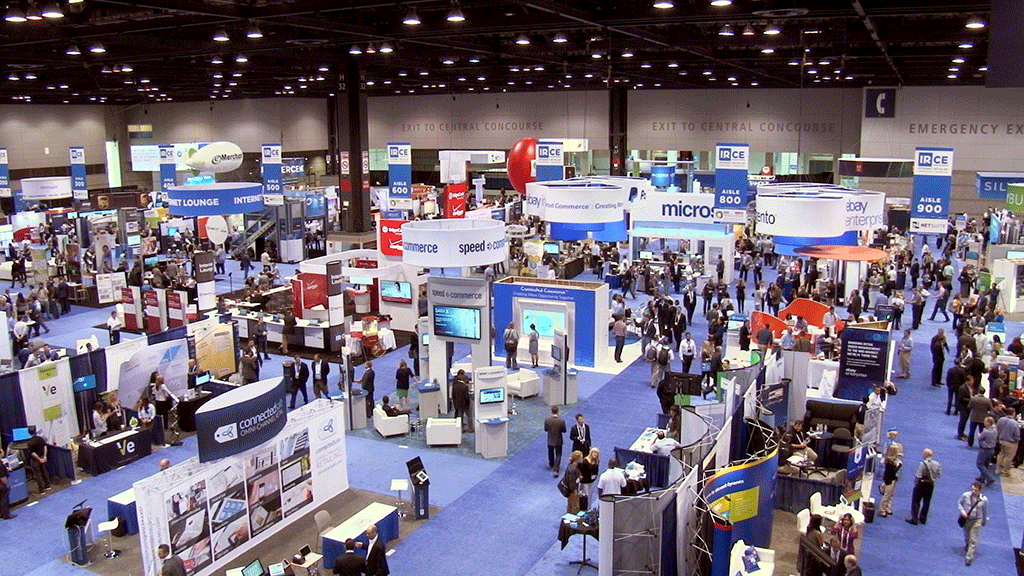“In the midst of regulations and logistics, remember that every obstacle is an opportunity in disguise.“
~ Sarah Adams
In the fast-paced world of business, finding effective avenues to connect with potential clients, showcase your products, and stay ahead of industry trends can be a challenging task. That's where trade shows and conferences come into play. These dynamic events offer a golden opportunity to make a lasting impression, expand your network, and gain invaluable insights.
Whether you're a seasoned exhibitor or stepping into this world for the first time, we've got you covered. From trade show services and vendors to understanding venue regulations and prioritizing health and safety in a post-COVID world, we're here to address your questions and concerns.
Key Takeaways
- Preparation is Key: Thorough planning and attention to detail are essential for success at trade shows and conferences.
- Prioritize Health and Safety: In the post-COVID era, complying with event-specific health and safety protocols is crucial.
- Understand Venue Regulations: Adhering to venue rules and regulations is necessary to avoid penalties and ensure a smooth experience.
- Secure Insurance Coverage: Protecting investments with the right insurance coverage is vital to mitigate risks associated with event participation.
- Stay Flexible: Being adaptable to changing circumstances and having contingency plans in place are essential for handling unexpected situations effectively.
Why Attend Trade Shows and Conferences?
Imagine a bustling marketplace where industry professionals, potential clients, and fellow entrepreneurs converge. This is the essence of trade shows and conferences—a place where opportunities abound and connections are forged.
- Lead Generation: At these events, you have a unique chance to engage with a concentrated audience genuinely interested in what you have to offer. These are your potential leads, the lifeblood of your business growth. It's like having a pool of prospects eager to learn more about your products or services.
- Brand Awareness: Building a strong brand presence is essential in today's competitive landscape. Trade shows and conferences offer a platform to showcase your brand, create a memorable impression, and carve out a niche in the minds of attendees. It's your moment to shine and stand out amid the crowd.
- Networking Goldmine: Networking is often cited as the cornerstone of business success. These events bring together professionals from various corners of your industry. It's a rare chance to exchange ideas, explore partnerships, and cultivate relationships that can last a lifetime. The connections you make here can lead to collaborations, referrals, and shared insights that propel your business forward.
- Knowledge Amplification: Conferences, in particular, are treasure troves of knowledge. Expert speakers, panel discussions, and workshops provide insights into the latest industry trends, innovative technologies, and best practices. It's like attending a crash course in staying ahead of the curve. By the time you leave, you'll be armed with fresh perspectives and strategies to implement in your business.
- Market Research Oasis: Curiosity and a keen eye can lead you to valuable market insights. Observing your competitors, understanding what's hot and what's not, and gauging customer preferences become remarkably accessible at these gatherings. It's like having a real-time pulse on your industry. You'll leave with a clearer picture of where your business stands and where it should be heading.
In short, trade shows and conferences are the bridge between you and a world of opportunities. But before you dive in, there's groundwork to be done.
Preparing for Trade Shows and Conferences
Picture this: You've decided to seize the opportunities offered by trade shows and conferences. Now, the stage is set, and it's time to prepare for your grand entrance. Success at these events is all about meticulous planning and attention to detail.
Booth Design:
- Layout: Ensure your booth layout is welcoming and encourages foot traffic.
- Signage: Use clear, concise messaging that communicates your brand and offerings effectively.
- Lighting: Proper lighting can highlight your products and create an inviting atmosphere.
- Interactive Elements: Engage visitors with interactive displays or demonstrations that showcase your products or services in action.
Staffing:
Your team on the ground is your brand ambassador. Select staff members who are not only knowledgeable about your products or services but also excellent communicators. Train them to:
- Engage Attendees: Teach your team how to initiate conversations, answer questions, and engage attendees proactively.
- Represent Professionally: Emphasize the importance of professionalism, including dress code and demeanor.
- Collect Leads: Train staff to collect contact information from interested attendees for follow-up.
Promotional Materials:
Equip yourself with the tools to leave a lasting impression. Prepare:
- Brochures: Informative brochures detailing your products or services.
- Business Cards: Ensure your contact details are readily available.
- Banners: Visually appealing banners that convey your brand's message.
- Giveaways: Unique and memorable promotional items that resonate with your brand.
Logistics:
The logistics of getting your exhibit to the event location can be a complex puzzle. Ensure you:
- Understand Shipping: Research shipping options, deadlines, and any event-specific guidelines.
- Pack Carefully: Use secure and durable packaging to protect your exhibit materials during transit.
- Track Shipments: Monitor the status of your shipments to ensure they arrive on time.
- Coordinate On-Site Handling: Communicate with event staff to ensure your materials are properly handled and delivered to your booth.
Understanding Rules and Regulations:
Every event comes with its own set of rules and regulations. It's crucial to:
- Review Event Guidelines: Carefully read the exhibitor manual and event-specific guidelines provided by the venue.
- Booth Setup: Understand rules regarding booth size, layout, and decoration restrictions.
- Safety Compliance: Comply with safety regulations, including fire codes, electrical requirements, and weight restrictions.
- Promotional Material Restrictions: Be aware of any restrictions on promotional materials, giveaways, or contests.
With your preparation checklist in hand, you're well on your way to making a memorable impression at the event. But that's just the tip of the iceberg.
Navigating Trade Show Services and Vendors
Once your booth design and team are ready, it's time to dive into the world of trade show services and vendors. These are the behind-the-scenes heroes who can make or break your trade show or conference experience. Understanding trade show services and vendors is a pivotal part of your event preparation. By selecting the right services and vendors, you can ensure that your booth not only looks impressive but also functions seamlessly.
Selecting the Right Services:
- Booth Construction: If you opt for a custom booth, you'll need a booth construction service. Look for experienced vendors who can turn your design vision into reality, ensuring that your booth stands out in the crowd.
- Graphics and Printing: High-quality graphics and signage are essential for attracting attention. Find a vendor who specializes in large-format printing and can deliver vibrant, eye-catching visuals.
- Furniture and Furnishings: Depending on your booth's size and purpose, you may need furniture and furnishings. Consider comfort and functionality when selecting items like chairs, tables, and display stands.
- Audio-Visual Equipment: If your booth incorporates multimedia elements, partner with an AV equipment provider who can supply and set up screens, projectors, sound systems, and lighting.
- Transportation and Logistics: Reliable transportation and logistics services are vital to ensure your exhibit materials arrive at the venue safely and on time. Choose a logistics partner with a track record of handling trade show shipments efficiently.
Vendor Selection Tips:
- Experience Matters: Look for vendors with a proven track record in serving trade shows and conferences. Ask for references and check their portfolio.
- Clear Communication: Effective communication is key. Choose vendors who are responsive and attentive to your needs, ensuring a smooth collaboration.
- Budget Considerations: While quality is essential, it's also important to stay within your budget. Obtain quotes from multiple vendors and compare services and costs.
- Flexibility: Vendors who can adapt to last-minute changes or provide on-site support can be invaluable when unexpected challenges arise.
- Event Familiarity: Prefer vendors who are familiar with the specific event or venue. They'll be more knowledgeable about event logistics and requirements.
Vendor Coordination:
- Timelines and Deadlines: Work closely with your selected vendors to establish clear timelines. Ensure they understand event deadlines for setup and teardown.
- On-Site Presence: If possible, have a representative from your booth construction or AV vendor on-site during setup. This can help address any issues promptly.
- Booth Inspection: Before the event, inspect your booth and all materials provided by vendors to ensure everything is in working order and meets your expectations.
Shipping and Handling: Getting Your Exhibit On-Site
Now that your booth is designed and vendors are in place, it's time to ensure that your exhibit materials arrive at the event venue intact and on schedule. The logistics of shipping and handling can be a puzzle, but with the right strategy, you can accomplish this phase seamlessly. Working the complexities of shipping and handling is essential to ensure that your exhibit materials arrive safely and in good condition. With meticulous planning and attention to detail, you can confidently tackle this aspect of event preparation.
Understanding Shipping Options:
- Freight Services: Freight services are often the go-to choice for trade show exhibitors. They specialize in transporting large and heavy exhibit materials, offering various shipping options such as ground, air, or expedited freight.
- Advance Warehousing: Some events provide advance warehousing services. This allows you to ship your materials to a designated location well in advance, ensuring they are ready for setup when you arrive.
- Direct-to-Show Services: Alternatively, you can opt for direct-to-show services. This means your materials are shipped directly to the event venue. It's crucial to know the venue's specific requirements and deadlines for this option.
Packaging for Protection:
- Secure Packaging: Proper packaging is essential to protect your exhibit materials during transit. Use sturdy, well-padded crates or cases designed for trade show shipping.
- Labeling: Clearly label all packages with your booth number, event name, and contact information. This ensures that your materials are easily identified and routed to your booth.
- Inventory List: Create an inventory list of all shipped items, including descriptions and quantities. Keep a copy of this list with you for reference during setup.
Tracking and Documentation:
- Tracking Shipments: Use tracking numbers and shipment tracking tools provided by your chosen carrier to monitor the status and location of your materials in real-time.
Shipping Documents: Keep all shipping documents, including bills of lading and delivery receipts, organized and readily accessible. These documents will be essential for booth setup and teardown.
Deadlines and Timing:
- Event Deadlines: Familiarize yourself with event-specific shipping deadlines. Missing these deadlines can result in delays or additional fees.
- Early Shipping: Whenever possible, consider shipping your materials well in advance of the event to allow for unexpected delays in transit.
On-Site Coordination:
- Receiving Shipments: If your materials are shipped directly to the event venue, coordinate with event staff to ensure they are received and stored securely until your arrival.
- Unpacking and Setup: Have a well-planned strategy for unpacking and setting up your booth materials. This includes having tools and equipment on hand for assembly.
Understanding Rules and Regulations of Venues
Each event venue comes with its own set of rules and regulations, and working within these guidelines is important to ensure a smooth and compliant experience at trade shows and conferences.
Exhibitor Manual Review:
- Start with the Manual: The exhibitor manual provided by event organizers is your comprehensive guide to venue rules and regulations. This document contains essential information specific to the event.
- Key Sections: Pay close attention to sections covering booth setup, move-in and move-out schedules, safety regulations, electrical requirements, and any restrictions on promotional materials.
Booth Setup and Design:
- Booth Dimensions: Ensure your booth dimensions conform to the specifications outlined in the exhibitor manual. Violating these dimensions can lead to costly modifications or relocation.
- Height Restrictions: Many venues have height restrictions for booths and displays. Be aware of these limitations and design your booth accordingly.
- Material and Decoration Guidelines: Review guidelines related to materials used for booth construction and decoration. Some venues may have restrictions on flammable materials or certain adhesives.
Safety Regulations:
- Fire Codes: Comply with fire codes and safety regulations. This includes ensuring that your booth materials are fire-resistant and that fire extinguishers are accessible.
- Electrical Requirements: If your booth requires electrical connections, follow the venue's electrical guidelines precisely. Ensure that all equipment is properly grounded and meets safety standards.
Booth Staffing and Conduct:
- Staff Badges: Staff members working at your booth should wear event-provided badges at all times. These badges grant access to the event floor.
- Engagement Rules: Encourage your booth staff to engage attendees respectfully and professionally. Disruptive or aggressive behavior can lead to complaints and penalties.
Promotional Material Compliance:
- Promotional Restrictions: Be aware of any restrictions on promotional materials, giveaways, or contests. Some events may have guidelines to ensure fair competition among exhibitors.
- Product Demonstrations: If you plan to conduct product demonstrations, confirm that they comply with venue rules. Some venues may have restrictions on noise levels or the use of hazardous materials.
Storage and Waste Disposal:
- Storage Areas: If the venue provides storage areas for exhibitors, use them for storing extra materials, but be aware of any access restrictions.
- Waste Disposal: Properly dispose of waste and packaging materials in designated areas. Leaving trash in your booth or common areas is a violation of venue regulations.
Penalties and Consequences:
- Understand Penalties: Familiarize yourself with the consequences of non-compliance with venue regulations. These may include fines, booth shutdowns, or removal from the event.
- Communication: If you have questions or concerns about specific regulations, don't hesitate to communicate with event organizers. They can provide clarification and guidance.
By diligently understanding and adhering to venue rules and regulations, you'll ensure a trouble-free and compliant presence at trade shows and conferences.
Health and Safety Guidelines (especially important in post-COVID scenarios)
In the wake of the COVID-19 pandemic, health and safety considerations have taken center stage at trade shows and conferences. Protecting the well-being of attendees, exhibitors, and event staff is paramount.
Event-Specific Protocols:
- Stay Informed: Keep yourself updated on event-specific health and safety protocols issued by event organizers. These guidelines may include mask mandates, social distancing requirements, and sanitation practices.
- Compliance is Key: Strictly adhere to all event-mandated safety measures. Non-compliance not only jeopardizes your participation but also poses a risk to public health.
Booth Design Modifications:
- Social Distancing: In your booth design, consider incorporating elements that promote social distancing. Spaced-out seating or product displays can help create a safer environment.
- Hygiene Stations: Include hand sanitizer stations within your booth for both staff and visitors. Clearly label these stations for easy access.
Staff Training:
- Health Protocols: Train your booth staff on the event's health and safety protocols. They should be well-versed in mask usage, maintaining distance, and sanitization procedures.
- Emergency Response: Prepare your team to respond to health emergencies, such as identifying COVID-19 symptoms and following venue-specific reporting procedures.
Attendee Interaction:
- Engaging Safely: When engaging with attendees, maintain physical distance and encourage contactless interactions. Consider alternatives to traditional handshakes or physical product demonstrations.
- Digital Solutions: Explore digital tools like QR codes or mobile apps to share information or collect leads, minimizing physical contact.
Sanitation Practices:
- Regular Cleaning: Implement a regular cleaning schedule for your booth. Disinfect frequently touched surfaces such as screens, product samples, and brochures.
- Personal Hygiene: Encourage good personal hygiene among your staff. This includes regular handwashing and the use of hand sanitizer.
Contingency Plans:
- Plan for the Unexpected: Develop contingency plans in case of health emergencies. This might include identifying a designated area for isolation if someone exhibits COVID-19 symptoms.
- Communication: Communicate your contingency plans with your booth staff so they know how to respond in various scenarios.
Virtual Participation Options:
- Hybrid Events: Explore hybrid event options that allow for virtual participation. This can be a safe alternative if you or your attendees have health concerns.
Flexibility and Adaptability:
- Be Flexible: Be prepared to adapt to changing circumstances. COVID-19 guidelines and restrictions may evolve, so stay flexible and adjust your plans as needed.
Insurance and Liability Considerations
While you prepare to make your mark at trade shows and conferences, it's essential to consider the unexpected. Insurance and liability considerations are your safety net in case unforeseen events occur. Insurance and liability considerations may not be the most glamorous aspect of event planning, but they are crucial for protecting your investment and ensuring a worry-free experience. By taking these precautions, you're not only safeguarding your business but also demonstrating professionalism in the world of trade shows and conferences. Here's how to protect yourself and your investment:
Types of Insurance:
- Exhibitor Insurance: Exhibitor insurance covers damages to your booth, equipment, and materials. It's your financial safeguard against mishaps like theft, fire, or accidents during the event.
- Liability Insurance: Liability insurance protects you from legal claims arising from accidents or injuries that occur within your booth or as a result of your presence at the event. It's crucial to ensure that you're not held personally liable for such incidents.
- Cancellation Insurance: In case unforeseen circumstances force the event's cancellation or your inability to participate, cancellation insurance can cover financial losses such as booth fees and travel expenses.
Assess Your Needs:
- Risk Evaluation: Conduct a risk assessment to determine the coverage you need. Consider the value of your exhibit materials, the potential for accidents, and the financial impact of event cancellation.
- Event Requirements: Some events may require exhibitors to carry specific types or amounts of insurance. Ensure that you meet these requirements to participate.
Selecting an Insurance Provider:
- Experienced Provider: Choose an insurance provider with experience in the trade show and conference industry. They will be familiar with the unique risks and coverage needs.
- Customizable Policies: Look for policies that can be tailored to your specific needs. Customizable coverage ensures you're not paying for more insurance than necessary.
- Competitive Quotes: Obtain quotes from multiple insurance providers to compare coverage options and costs. Don't hesitate to negotiate for the best deal.
Policy Review:
- Policy Details: Thoroughly review the terms and conditions of your insurance policy. Understand what is covered, the deductible, and any exclusions.
- Documentation: Keep all insurance documents, including policy certificates, readily accessible. You may need them for event registration or in case of a claim.
Emergency Response Plan:
- Claims Process: Familiarize yourself with the insurance claims process. Understand how to report incidents and the required documentation.
- Emergency Contacts: Maintain a list of emergency contacts, including your insurance provider's contact information. This ensures you can reach out quickly in case of an incident.
On-Site Precautions:
- Safety Measures: Implement safety measures within your booth to reduce the risk of accidents. Secure heavy equipment, tape down cables and use slip-resistant flooring.
- Signage: Clearly display safety instructions and emergency contact information within your booth for both staff and visitors.
Peace of Mind:
- Focus on Your Goals: With insurance and liability considerations in place, you can focus on your trade show or conference goals with peace of mind. You're prepared for the unexpected, allowing you to make the most of your event participation.
Summary: Your Path to Trade Show and Conference Success
Congratulations! You have made it thus far through the vibrant world of trade shows and conferences, armed with knowledge and insights to make the most of every opportunity. As you stand at the threshold of these dynamic events, let's recap the key takeaways that will guide you to success:
- Embrace the Opportunities: Trade shows and conferences are bustling marketplaces teeming with potential. They offer you a platform to generate leads, amplify your brand, build invaluable connections, gain knowledge, and conduct market research.
- Prepare with Precision: Meticulous preparation is your secret weapon. From booth design to staff, training, logistics, and to compliance with venue regulations, thorough groundwork is the foundation of a successful presence.
- Prioritize Health and Safety: In the post-COVID era, health and safety considerations are paramount. Comply with event-specific protocols, adapt your booth design for social distancing, and ensure your staff is well-versed in safety measures.
- Venue Rules: Understand and adhere to venue rules and regulations. Compliance is key to avoiding penalties and ensuring a smooth experience.
- Secure Your Investment: Protect your investment with the right insurance coverage. Assess your needs, select a reputable provider, and familiarize yourself with policy details and the claims process.
- Stay Prepared: Create contingency plans for unexpected situations and be adaptable in the face of changing circumstances. Your ability to respond effectively can make all the difference.
Keep your eyes on the horizon, stay connected with your audience, and continuously seek ways to innovate and improve.

See you out there!



